5 Ways to Take a (Real) Break Amidst Creative Work
with help from Dani Shapiro, Carl Phillips, and Lydia Davis
Hi Friends,
I’m headed east! If you’re near Boston, Vermont (Marlboro!), or Montréal and you want to meet up, send me a note! This East Coast trip is an extension of the Association of Canadian College and University Teachers of English (ACCUTE) Conference in Montreal, where I’ll be hosting a panel on “Creative Writing Inspiration Beyond the Workshop” with Lauren Kirshner and presenting on coaching students on asking better questions about work-in-progress as part of a panel on “Engines of Feedback,” hosted by Glen Clifton. I’m looking forward to nerding out on creative writing pedagogy with smart thoughtful folks. And hugging friends and immersing myself in water whenever I can!
Distraction Versus Break
I recently1 wrote about Oliver Burkeman’s reframing of distractions as “places we go to seek relief from the discomfort of confronting limitation” (107). According to this view, we set down a notebook and reach for our phones (or click away from a poem draft and open a browser window) when we run up against the discomfort of a possible limit: Maybe I don’t have time to finish this. Maybe I’m not smart enough for this. Maybe this project won’t go anywhere and I should really be working on something else. . .
The antidote to distraction, per Burkeman, is essentially to stop expecting this feeling to go away, to say something like: I’m a finite human. I am experiencing the natural doubts that arise when doing meaningful work. This feels weird/bad, and that’s ok. I’m digging back into the meaningful work.
With time, we might hope to become smoother and more confident with this process: feel, recognize and name, still choose to remain. I’m working on this.
But I’ve realized a need to clarify a few other things for myself:
Choosing to remain in the work (rather than seek relief from the discomfort of confronting my limitations) doesn’t mean I never take a break.
Checking email (or Social Media, or brown boot options, or, heck, even Canvas to see if that student got that late assignment in yet or not)—where I often go to seek relief2 when I hit a limit in my creative work—is NOT A REAL BREAK.
So, what is a real break?
Ritualized Dream Time, or The Opposite of Distraction
In Still Writing, Dani Shapiro, a former smoker, talks about what a smoke break meant for her writing:
“Those cigarette breaks had provided me with a ritualized dream time. Smoking was good for the writing. That tapping of the pack, lighting of the match, leaning back, and smoking, allowed for a prescribed amount of time—three minutes? five?—in which I was doing nothing but smoking, gazing out the window at the courtyard below, and allowing my thoughts to sort themselves out” (157-158).
She’s not suggesting that everyone take up smoking, but she has something important to point out about different types of breaks.
She writes: “This may be the most important piece of advice I can give you: The Internet is nothing like a cigarette break. If anything, it’s the opposite. One of the most difficult practical challenges facing writers in this age of connectivity is the fact that the very instrument on which most of us write is also a portal to the outside world.” (159).
Again, THE INTERNET IS NOTHING LIKE A CIGARETTE BREAK!
Why? Because we open ourselves up to a firehouse of inputs. Instead of a meditative physical ritual that occupies the body and allows thoughts to “sort themselves out,” it’s a turning of our attention from our chosen focus to whatever an email sender (or social media post or pop-up ad) wants us to focus on. Often, it’s a dizzying whiplash of stimuli that prompts sorrow, curiosity, rage, humor, envy, overwhelm.3
So, if not an internet break and not a cigarette break, what kind of break?
Five Ways to Take a Break
1. Make a slow cup of coffee or tea
[My kid next to me, playing a video game: What’s that?
Me: A video of me making coffee.
Kid: It sounds like peeing.
Me: Yep.]
Like, make it as slow as possible. And don’t do anything else while you’re doing it. The slow careful swirl of pour-over coffee is great. The little bamboo whisk of matcha is perfect.4
2. Take a walk by some trees (or around the block or building or even up and down the hall)
Even tiny walks are great! The Getaway cabins my friend Austen and I go to have two snack-sized walks to little waterfalls. Dreamy!
3. Knit a few rows, embroider a few stitches, build a few bricks
I knit a row or two of some fingerless gloves for my mom. Austen embroiders a few stitches on a sleeping cat for a friend. My kid dangles off the bed to build Legos.
4. Sort, tidy, or just stretch or stare out the window
In My Trade is Mystery, Carl Phillips talks about how vacuuming or starting a load of laundry can shake something loose in his writing:
To get away from the reading and writing can also lead to problem solving, when it comes to the writing. Often when I can’t come up with a title or when I can tell the writing’s not as it should be, but I can’t tell how or how to fix it, I’ll go for a walk or vacuum a room or start some laundry. At the very least, I feel I’ve done something productive to counter the feeling of having wasted my time with a bad draft. But often the change of activity also shakes me loose—distracts me—from the thinking I was stuck in: the bad draft suddenly has potential, I can see now what’s missing or where I strayed from the point or what I meant to say all along (66-67).
Stepping away and engaging the body (without introducing inputs!!!) allows Phillips to return to his work with a different perspective and see a way to move forward.
5. Draw, doodle, dip pen
What if you paused to sketch something you ate for breakfast or just draw spirals on a page like Lynda Barry recommends?
I’ve been making little dip pen quote squares drawn from my Commonplace Book, and I love the movement of the dip pen, the bodily concentration needed to make a smooth(ish) line, extending pressure on a downstroke and releasing pressure on an upstroke.
A Final Tip from Lydia Davis
Lydia Davis’s Essays One includes an essay called “Thirty Recommendations for Good Writing Habits,” a highly concentrated burst of humour and insight, including this:
Important practical tip: After a session of writing, leave some clear time in which you can note down what your brain will continue to offer you. In other words, do not go directly from writing to lunch with friends or to a class. Do not go straight to your emails or your phone. Leave at least fifteen minutes completely open. Do the dishes or take a walk or a shower—do something physical in which you can remain open to your random thoughts. Your brain will offer you a few more good ideas during this time. Don’t lose them by silencing them with other activites (241).
Doing a residency at Banff, I noticed how swimming after writing kept me available for these extra brain offerings. What Davis evokes here feels identical to what Phillips and Shapiro are talking about: the value of an engaged body and a drifting mind, the ideas that come when we look away from our work without opening the door to external inputs.
End a day in the studio with ten minutes for washing lunch dishes in silence. Walk to the bus without putting headphones in for a podcast. Close the laptop and water your plants before putting on your coat.
Of course, here’s what I keep having to learn over and over again:
how to actually take the breaks even when the work is going well and I’m absorbed;
how to experience the absence of “inputs” as relief, not deprivation; and
how to notice and gently begin again when I fail at both of these.
What about you? Do you build intentional breaks into your creative work? What breaks replenish you or help shake something loose?
Let me know in the comments!
Yours,
Bronwen
PS: If you liked this post, please hit the heart to let me know! You can also support this newsletter by subscribing, sharing, or commenting. (I’ve turned off the pledge thing btw).
PPS: I recorded voiceover again. :) Hit play at the top to hear it.
Flexible understanding of “recently.”
Why is something like email a relief? For me, it’s because it frequently offers me a discrete manageable task that someone else wants me to do that I can complete. Hi, dopamine. Or, you know, maybe there will be good news sometime. It happens.
I’m not advocating for isolating ourselves from the world in a self-protecting cocoon. But I am saying that I think it’s ok to block out time when you’re unavailable to outside inputs.
My summer office treat has been a selection of stone-milled tea powders from Paragon Tea Room. I keep ice and milk in the lounge fridge and make myself tea lattes on ice. This one is Genmaicha, and it’s so good!

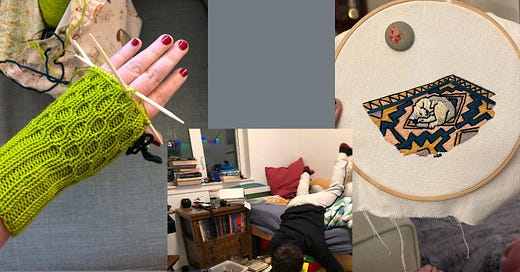

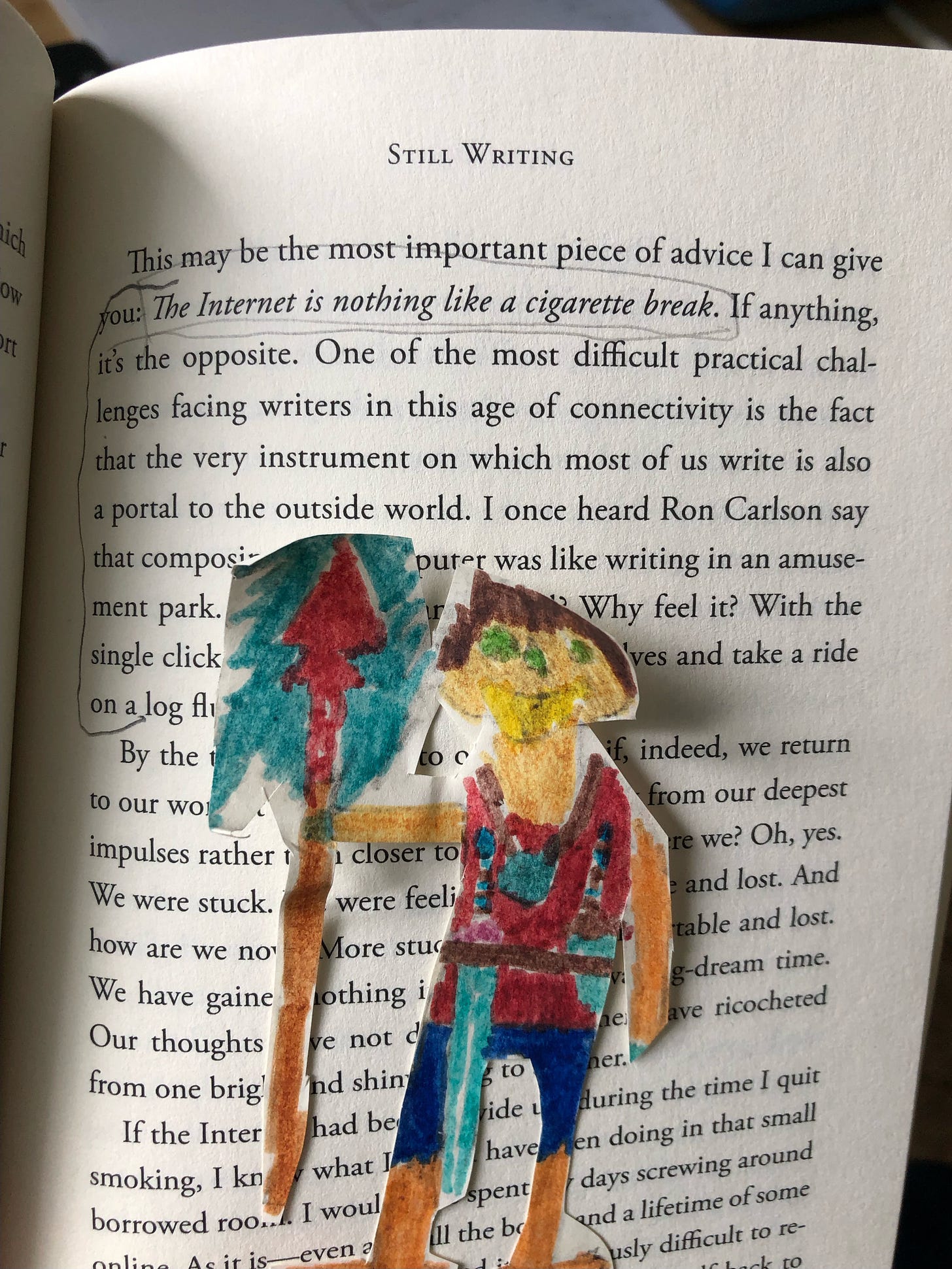
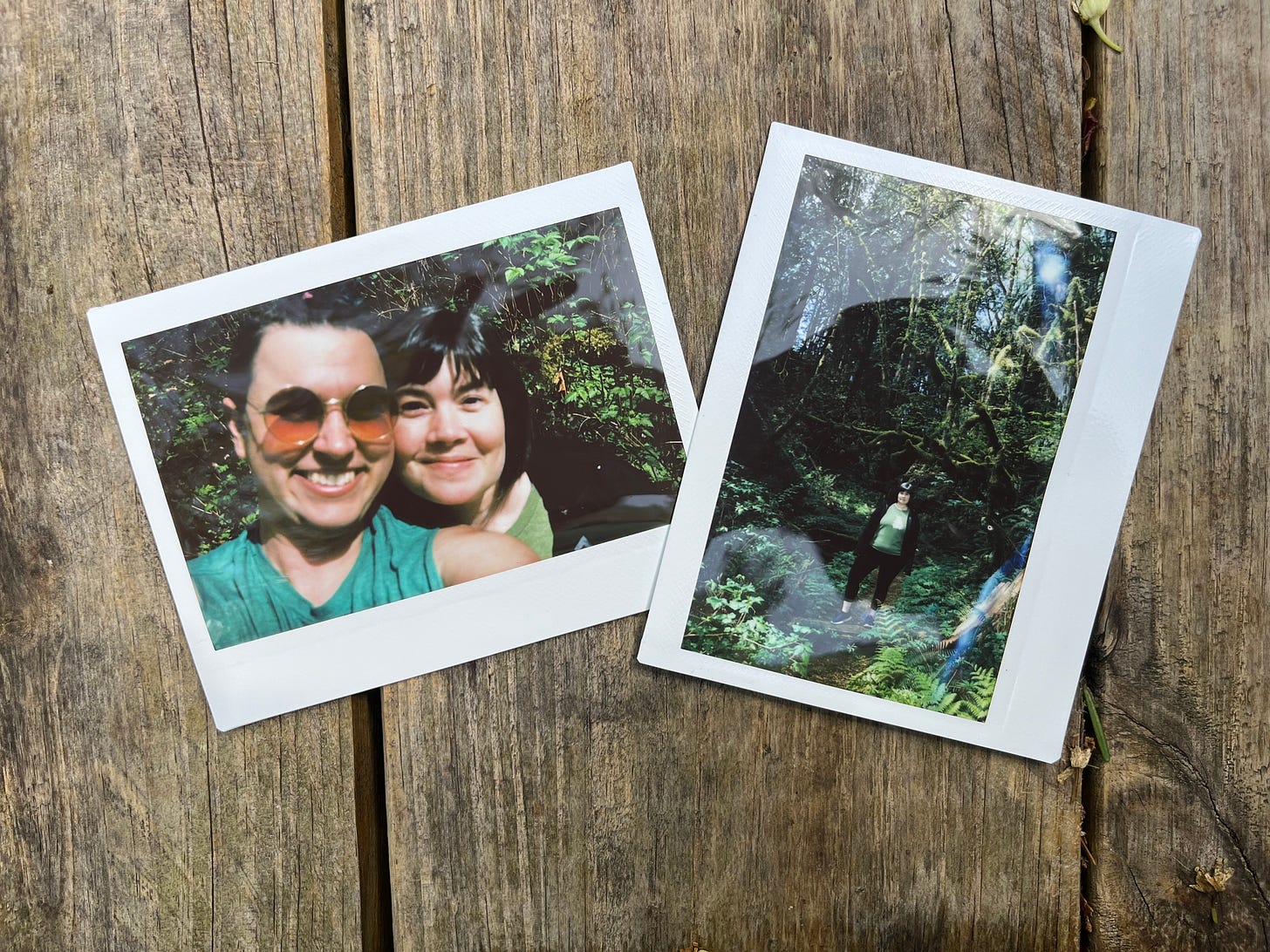

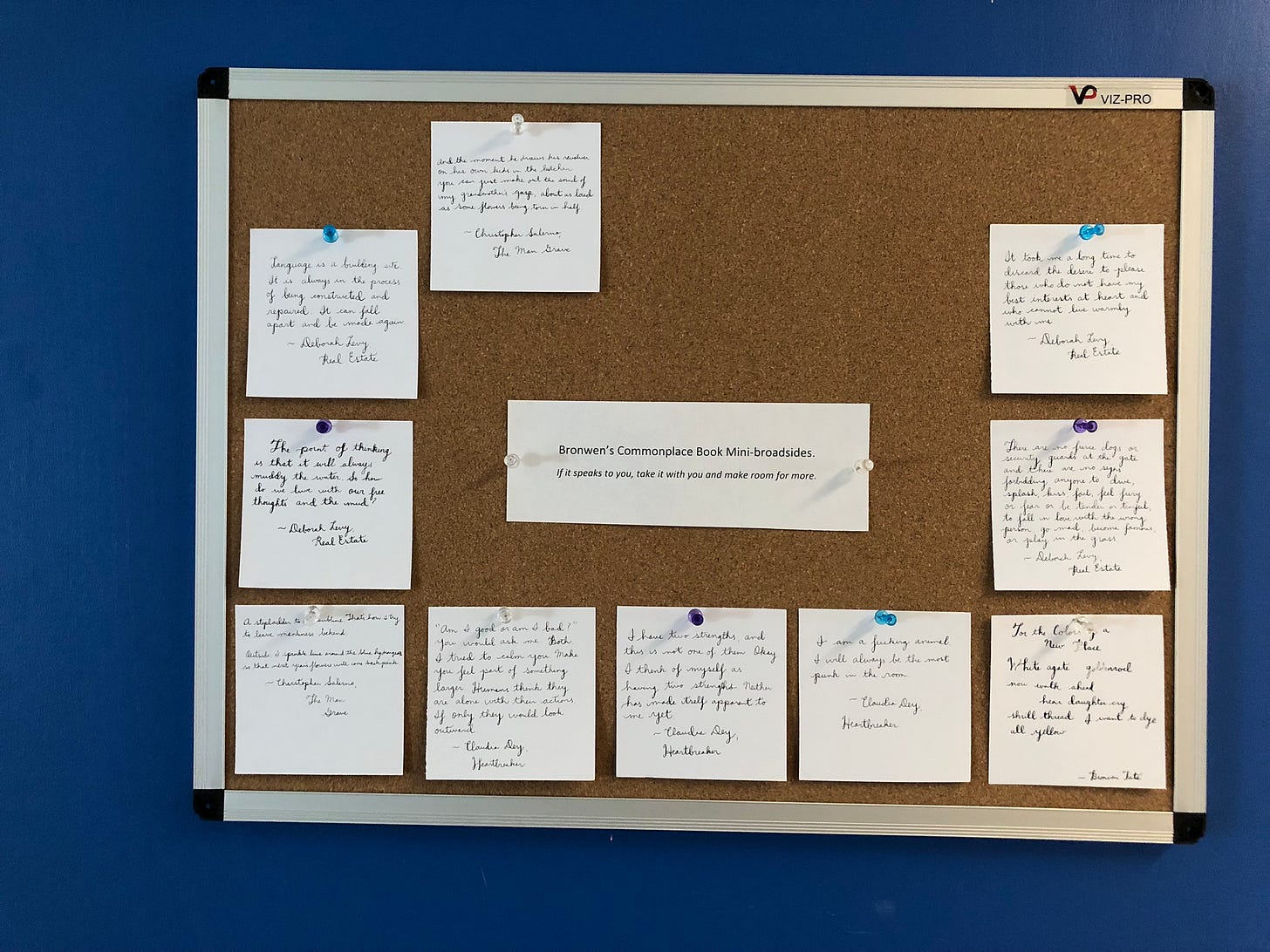
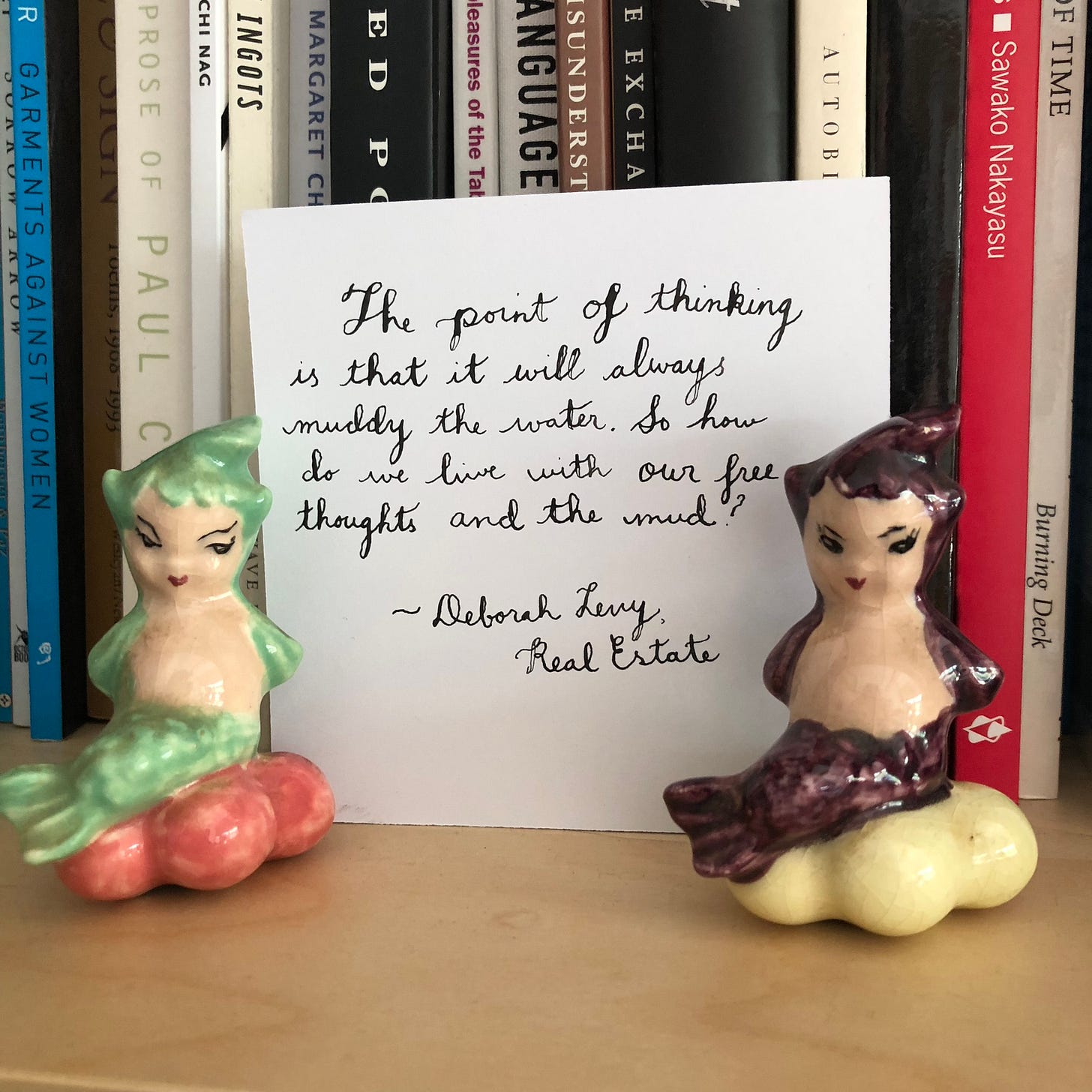
Great post! I think about breaks/distractions/the work of writing a lot and recall reading once that Zadie Smith recommended not writing on a computer with internet connection… hard to do if you only have one at home! But a worthwhile idea. The internet is not a break is so very true… it ends with me feeling often more drained then revived. I find walking works best… and then also not getting sucked into too many chores as an avoidance tactic!
I love this! When able to work remote, I find it helpful to punctuate each intensive session of work (creative or “day job” office operations, doesn’t matter) with a quick ten minute stroll to the tiny stream in the lot next to my housing complex.
Such a blessing to be near running water. Each walk of the pine needle-studded path to its bank restores me. We have a golden hawk, ducks, deer (everywhere, eating everything), a resident fox, geese, and more. The daily jaunt enables me to watch the slow progression of life as fawns grow into teenagers with growing horns, leaves bud, bloom and fall, and each season follows.
From 1985 to 2020, I worked in DC office buildings. For the last 9 years, my open-cubicle computer station faced a large column (useful for discouraging chit chat). During an intensive deadline, I would if at all doable take ten minutes to walk and look for natural life, and once saw THIS (below). First of its kind that spring!
https://x.com/MamurphyMaureen/status/1111069077521526789